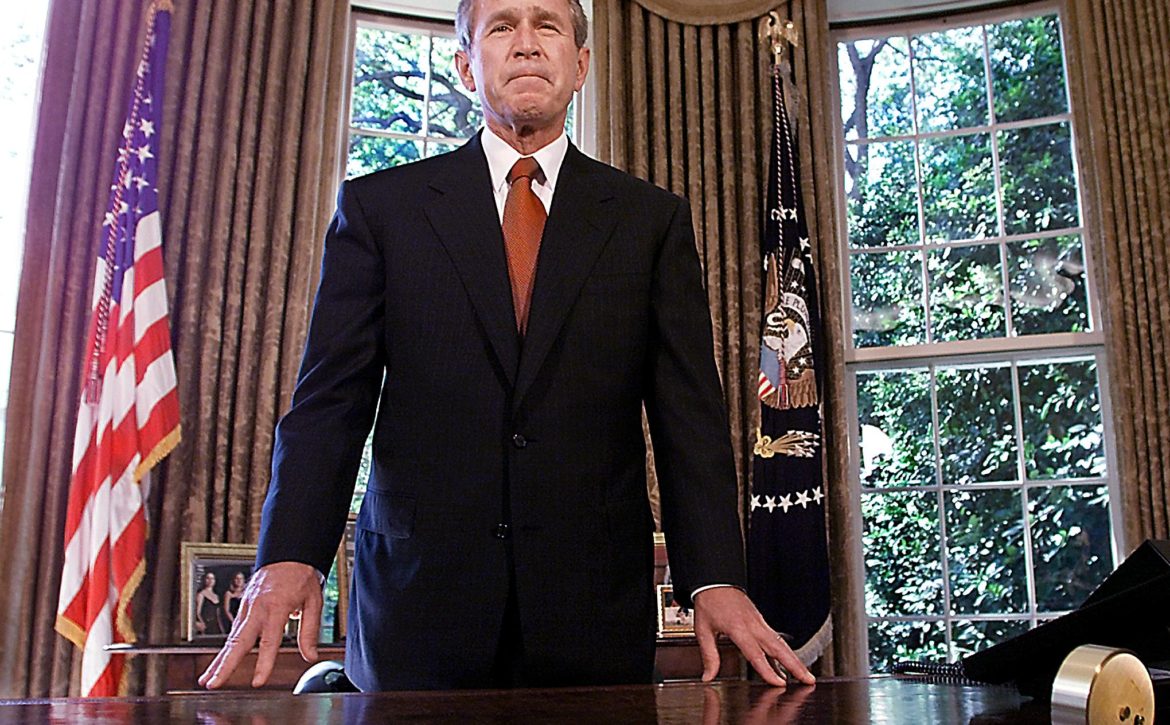
The Afghanistan War Was Founded on Lies. Some People Are Still Telling Them.
From its inception in 2001 to its ignominious end, the U.S. war in Afghanistan has been defined by lies. It was a lie when, in 2001, President George W. Bush told service members that “your mission is defined, your objectives are clear…. We will not fail.” It was a lie when President Barack Obama proclaimed in 2016 that America had successfully “trained Afghan forces to take responsibility for their own security.” And it was a lie every time pundits and officials insisted that victory was around the corner.Manifold elites are now lying about the fall of Afghanistan “under Biden’s watch.” In The New York Times, the American Enterprise Institute’s Frederick Kagan claims that “a disastrous Taliban takeover wasn’t inevitable,” though it has been obvious for years that the Taliban was winning and that the Afghan government would fall eventually without overwhelming U.S. support. In The Wall Street Journal, former National Security Advisor H.R. McMaster and Bradley Bowman of the Foundation for Defense of Democracies assert that “the refusal to provide the Afghan people the support necessary to stem a humanitarian catastrophe emboldens China, Russia and other adversaries eager to proclaim the U.S. an unreliable partner and a declining power,” though the U.S. has proved time and again that it is already those things. And in The New York Times, Bret Stephens perplexingly affirms that “Disaster in Afghanistan Will Follow Us Home,” as if the militarization of U.S. policing that occurred in the War on Terror’s wake hasn’t already done significant damage to the country.These and other comments evince the cynicism that always defined the invasion of Afghanistan. It’s hard to imagine that Kagan, McMaster, Bowman, and Stephens really believe that America’s vital security or economic interests will be adversely affected by the Taliban’s victory. The U.S. remains a very safe, powerful, and rich country that faces no serious security threats. Rather, one gets the impression that the hawks are annoyed and embarrassed that a small paramilitary group was able, like the North Vietnamese Army before it, to reveal, beyond the shadow of a doubt, America’s inability to remake foreign nations in its image.The cynicism, though, is truly something to behold. While the U.S. war in Vietnam was a pointless tragedy that resulted in untold human misery, it was not totally absurd for U.S. decision-makers to believe that communism was an existential threat worth fighting. The same cannot be said for the war in Afghanistan—only paranoiacs could have ever claimed that “terrorism” could seriously harm the United States. As such, for twenty years the U.S. effort in Afghanistan has done little but enrich defense and military contractors and bolster the global heroin trade as it destroyed a country about which Americans knew and understood little. First time as tragedy, second time as farce.Other writers subscribe to the so-called Pottery Barn rule: If you destroy a country, you fix it—no matter how long it takes. As the Manhattan Institute’s Brian Riedl remarked on Twitter, “The issue [with the U.S. withdrawal from Afghanistan] is the ‘Pottery Barn Principle’ – you break it you buy it. If we want to overthrow a dangerous government threatening us, do we leave the place in chaos without helping install any new government that’s any different? That’s the challenge.”But the invocation of the Pottery Barn rule in relation to Afghanistan doesn’t make sense. It’s not as if the United States made one fixable mistake and decided to leave. It’s more like Uncle Sam went into a Pottery Barn, strapped bombs to every item, detonated those bombs, and then ran a steamroller over the smoldering remains. The only way that Pottery Barn will be fixed is if some other group decides to rebuild it, likely without the direct aid of Uncle Sam (though the rebuilders of Afghanistan could and should demand money from the U.S.).Ironically, by trying to force history upon the Afghan people, the U.S. wound up removing them from it, stifling any organic attempts to transform the country. After twenty years of an expensive and terrible war, the Taliban was able to retake the country in a matter of weeks. Afghanistan therefore finds itself where it was on September 10, 2001, with very little to show for it. It’s a tragedy of epic proportions that the U.S. rejected a December 2001 Taliban surrender offer, or any of the innumerable opportunities for ending this war on terms more favorable than those that have now taken hold.Perhaps the best thing about the Taliban advance over the past few weeks was that local officials didn’t resist it, thus sparing the population further violence. Seeing which way the wind was blowing, most of them surrendered their arms and accepted the reality that their military and government didn’t have the capacity to defend itself. Afghan President Ashraf Ghani has fled the country, after apparently looting the Afghan treasury, and will likely live a life of resplendent exile—possibly with a sinecure at one of our nation’s Ivy League universities or prestigious think tanks.In 2019, the “Afghanistan Papers” proved that the U.S. government had been lying about the war’s progress for years. But in our hyperreal time, no one really seemed to care, least of all American citizens who didn’t directly suffer the consequences of their nation’s imperial adventures. We therefore went back to accepting the lies, until the Taliban’s advance shattered them once and for all.One hopes that the experience of Afghanistan—and Iraq, Libya, Yemen, and many more places—will destroy the dream, expressed by every American president since Franklin Delano Roosevelt, that the U.S. is able to use its overwhelming power to reshape foreign nations along American lines. This project has failed time and again, and will do so in the future.America, in short, can’t do whatever it wants in the world, and shouldn’t try. We are not, as Madeline Albright infamously affirmed in 1998, the “indispensable nation” able to “see further than other countries into the future.” If anything, we’re the opposite, and it’s time for Americans to look themselves in the mirror and ask: What if we’re the bad guys?
Read More


